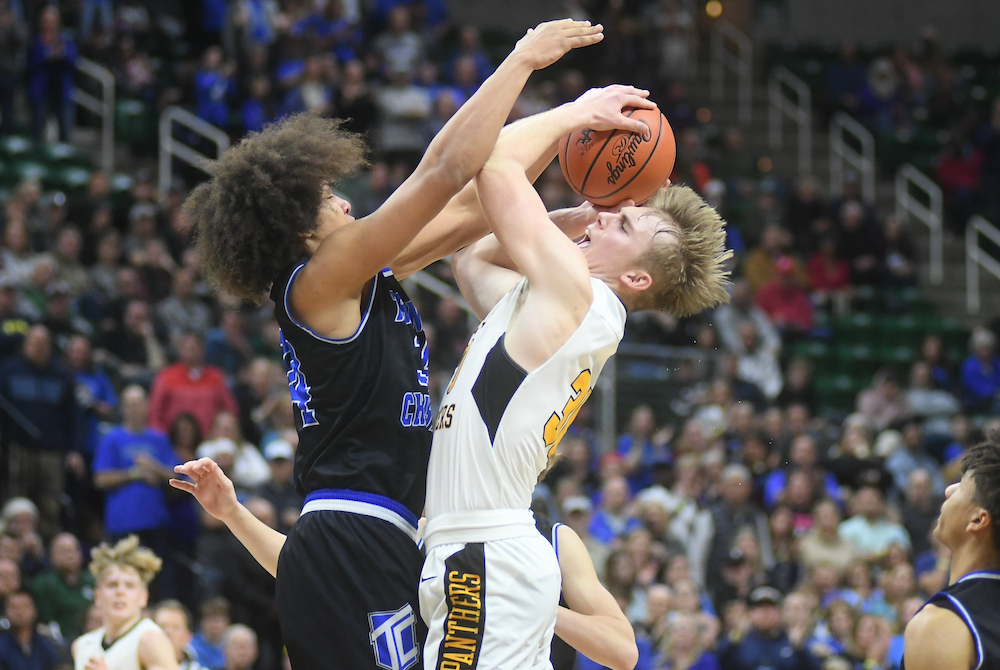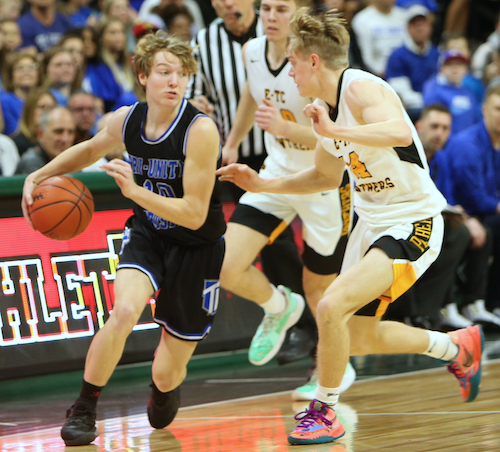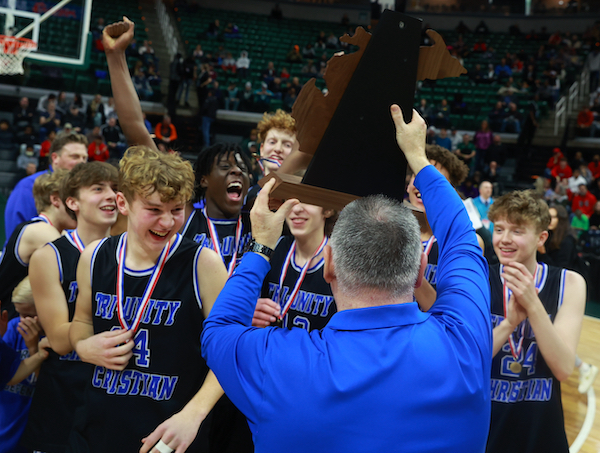
Detroit 'Longtime' Boys Coaches Down to Few
By
Tom Markowski
Special for Second Half
December 14, 2016
Gary Fralick considers himself one of the fortunate ones.
 Fralick, 66, is in his 32nd season as a head boys basketball coach. He retired from his teaching position in 2013. He started coaching at Redford Thurston in 1979, went to Royal Oak Kimball in 1984 and is in 23rd season as the head coach at Troy.
Fralick, 66, is in his 32nd season as a head boys basketball coach. He retired from his teaching position in 2013. He started coaching at Redford Thurston in 1979, went to Royal Oak Kimball in 1984 and is in 23rd season as the head coach at Troy.
Fralick might be lucky, but he is unquestionably rare. Fralick is believed to be one of three coaches in the Macomb/Oakland/Wayne area who has coached for more than 30 seasons.
There’s Dan Fife at Clarkston and Kevin Voss of Clinton Township Chippewa Valley, both of whom in their 35th seasons, all at the same school.
Another, Greg Esler at Warren DeLaSalle, is in his 30th season. He was the head coach at St. Clair Shores Lake Shore for seven seasons before going to DeLaSalle in 1994.
“We’re part of a dying breed,” Voss said.
It certainly appears so. Coaching longevity has taken on a different meaning recently. Twenty seems like a lot in these times, and in reality it is a long time. Twenty years or so ago, 20 years was normal. There’s a new normal, and 20 or 25 years isn’t it.
Many factors have contributed to this change. A person’s personal and family life often don’t coincide with the demands of coaching basketball. The responsibilities that come with coaching have increased. Some coaches say that to be an effective coach, it can be a 10- or 11-month job.
Two factors are at the forefront, and they are both financial. Coaches used to be educators as well as coaches. Yes, coaching can be viewed as teaching on the court, but at one time teaching in a classroom and coaching used to go hand in hand.
 Then there’s the subsidy coaches receive. It varies from school district to school district. Some make $4,000 a season, others can make $7,000. And it also costs money to run a program; unless the coach receives financial help from a booster club or parents, the money he or she receives begins to dwindle.
Then there’s the subsidy coaches receive. It varies from school district to school district. Some make $4,000 a season, others can make $7,000. And it also costs money to run a program; unless the coach receives financial help from a booster club or parents, the money he or she receives begins to dwindle.
But the most important factor is time.
“A tremendous amount of time is devoted to watching DVD or tapes,” Fralick said. “I know I’m dating myself with saying that. The point is, you’re watching a lot. There’s more scouting. And you don’t get paid much. Why don’t they stay as long as they used to? They get burned out. They want to spend more time with their families.
“You don’t see as many of the young coaches stay. Coaches don’t have the ambition to coach a long time. It’s not a profitable job. I don’t know what other coaches make. We used to compare what we made. Not anymore.
“Thirty years or more? I don’t see it happening. There’s the dual job thing. Things have changed. To me, it’s been a great job.”
To compensate for being away from home, Fralick brought his family with him. Sort of. He coached his son Gary, Jr., and Tim. Gary, a 1996 Troy graduate, played for his father his junior and senior seasons and Tim, a 1999 graduate, played four seasons on varsity. Fralick said he was even more fortunate to coach both on the same team (during the 1995-96 season).
Then there’s his wife, Sharon, who remains the scorekeeper.
“I’ve always had a passion for coaching and teaching,” Fralick said. “I love the game of basketball. I love the kids. There’s never a dull moment. It’s been a great ride.”
Vito Jordan has been around basketball all of his life. His father, Venias Jordan, was the boys head varsity coach at Detroit Mackenzie and Detroit Mumford before stepping down as a head coach only to return to the bench assisting his son the last six seasons.
Vito Jordan, 31, became a head coach at Detroit Osborn when he was 24. He started his coaching career the year before as an assistant to Henry Washington at Macomb College. Jordan went to Detroit Community after one season at Osborn and guided Community to its only MHSAA Finals appearance (Class B, 2013). He’s now in his fourth season as the head coach at Detroit Renaissance.
“I followed my father all of my life,” Jordan said. “I knew what I wanted to do when I was in college (Alma College). This is what I want to do the rest of my life.”
It’s different in Detroit. Schools close. Job titles change. Jordan, for instance, teaches at the Academy of Warren, a middle school in Detroit. It’s a charter school, not within the Detroit Public School system, therefore he receives his pay from two separate school systems (Renaissance is in the DPS).
There is a distinction. In some school systems coaches will receive a percentage – let’s say for argument sake, 10 percent – of their teaching salary to coach. Let’s say a person makes $60,000 a year to teach. He or she would then receive $6,000 to coach. If you coach two sports, that’s $12,000.
 Jordan is not privy to such a contract. Each job is separate. Jordan loves to coach, and he understands he must be a teacher to earn a decent living, and he’s content to continue on the path he is following. But he also knows that to make a good salary just coaching one must move on to the collegiate level like others have done.
Jordan is not privy to such a contract. Each job is separate. Jordan loves to coach, and he understands he must be a teacher to earn a decent living, and he’s content to continue on the path he is following. But he also knows that to make a good salary just coaching one must move on to the collegiate level like others have done.
“When there were coaches like my dad, Perry Watson (Detroit Southwestern), Johnny Goston (Detroit Pershing) and others, they all worked in the (Detroit Public) school system. Everyone was teaching. That was your career. None of them had aspirations of being a college coach. Not even Watson. Now everyone isn’t in the teaching profession. Maybe they do have a degree and maybe they don’t. The point is, most aren’t teachers. I can count on one hand those (in Detroit) who have their teaching certificate and coach.”
Jordan noted such successful PSL coaches like Derrick McDowell, Steve Hall and Robert Murphy who left high school to pursue a coaching career in college. Murphy guided Detroit Crockett to the Class B title in 2001 and is now the head coach at Eastern Michigan. McDowell has had two stints as a collegiate assistant coach, most recently at EMU. He’s since returned to coach at Detroit Western. Hall coached Detroit Rogers to three consecutive Class D titles (2003-05) before going to Duquesne University and Youngstown State as an assistant coach. Hall returned to Detroit last season and is in his second season as head coach at Detroit Cass Tech.
Jordan said they left high school to challenge themselves professionally, among other considerations. Voss said there are variables that influence how long a person lasts, in one school district or in coaching in general, that didn’t exist 20 years ago.
“Athletics have become pervasive in high school,” he said. “The whole booster situation you find in college is here. You can be winning but not winning enough. It’s a trickle down affect.
“Coaches complain about parents. Parents complain about playing time. High school sports is not as pure as it once was. Winning is way more important now. Now a coach comes in with a three-year window. You can have one or two down years, and the third you’d better win.
“Then there’s the pressure on your family. I’ve been lucky. My wife and I have had the players over for team dinners. We create a family atmosphere. It’s a change of society. I don’t envy the young coaches coming in.”
Community involvement has always been a priority for Voss. To keep a hand on the pulse, Voss heads the elementary basketball program within the Chippewa Valley school district. Games are held on Saturdays, and approximately 750 students take part.
“You have to have the right fit,” he said. “I’m in the right spot. You coach for different reasons when you get older. I’m enjoying the game. There’s a different level of satisfaction.”
 Tom Markowski is a columnist and directs website coverage for the State Champs! Sports Network. He previously covered primarily high school sports for the The Detroit News from 1984-2014, focusing on the Detroit area and contributing to statewide coverage of football and basketball. Contact him at [email protected] with story ideas for Oakland, Macomb and Wayne counties.
Tom Markowski is a columnist and directs website coverage for the State Champs! Sports Network. He previously covered primarily high school sports for the The Detroit News from 1984-2014, focusing on the Detroit area and contributing to statewide coverage of football and basketball. Contact him at [email protected] with story ideas for Oakland, Macomb and Wayne counties.
PHOTOS: (Top) Troy boys basketball coach Gary Fralick, left, is in his 32nd season coaching. (Middle) Detroit Renaissance boys coach Vito Jordan is following in the coaching footsteps of his father, Venias. (Below) Chippewa Valley boys coach Kevin Voss, left, is in his 35th season at his school. (Top and below photos courtesy of C&G Newspapers; middle photo courtesy of Detroit Public School League.)

Tri-unity Christian Back on Top As Titus Leads Overtime Surge
By
Dean Holzwarth
Special for MHSAA.com
March 26, 2022
EAST LANSING – The Wyoming Tri-unity Christian boys basketball team fell short last season in its bid to add another state championship to its storied history.
Senior point guard Brady Titus wasn’t about to let history repeat itself.
Titus scored a game-high 33 points to propel the Defenders to a thrilling 56-45 overtime win over Ewen-Trout Creek in Saturday’s Division 4 Final at the Breslin Center.
“There was so much motivation, just coming up short last year,” Titus said. “Just knowing that we lost to a team that we could’ve beat really carried on into this year, and there’s a great sense of relief knowing that we really did this as a team.
“I’m more than thankful, and it’s hard to describe how I feel right now other than a lot of excitement.”
The Defenders (20-6) lost to Detroit Douglass a year ago, 46-41, but gained redemption by outscoring the Panthers 13-2 in overtime Saturday.
 Tri-unity captured its fifth Final, but first since 2011 under longtime coach Mark Keeler, who watched his team struggle in the second quarter after a strong start.
Tri-unity captured its fifth Final, but first since 2011 under longtime coach Mark Keeler, who watched his team struggle in the second quarter after a strong start.
The Defenders led 16-11 after the first quarter, but Ewen-Trout Creek opened the second with an 11-1 surge to snare a 22-17 lead.
The Defenders countered with a 6-0 run to hold a slim 23-22 advantage, but Ewen-Trout Creek ended the half with seven straight points.
A 3-pointer from Eric Abramson at the buzzer gave the Panthers a 30-23 lead at the half.
“I was proud of my guys because we didn’t quit or get discouraged after that buzzer 3-pointer at the end of the first half,” said Keeler, who was appearing in his 10th Final. “Ewen-Trout Creek was gutty and tough, and they dominated the boards in the first half.”
Titus, who will play in college at Indiana Tech, scored 23 of his points in the second half and overtime after being held to 10 points in the first half.
He was poked in the eye inadvertently early in the third quarter, and it fueled his play.
“It was an accident for sure, but me being the person I am I took it personally,” Titus said. “That really fired me up to just go out there and play and compete.”
Titus stepped up several times when his team needed him during the second-half rally.
His driving lay-up with 33 seconds left knotted the score at 43-43 and sent the game to overtime after the Defenders got a defensive stop in the closing seconds.
 “He does it so often,” Keeler said of Titus’ heroics. “He’s just an amazing young man, and he made plays for us.”
“He does it so often,” Keeler said of Titus’ heroics. “He’s just an amazing young man, and he made plays for us.”
Tri-unity turned to its defense in overtime to help secure the win.
Sophomore Owen Rosendall, who made three 3-pointers and finished with nine points, had a steal and took a defensive charge, while junior center Hanif James had a huge blocked shot with the Defenders clinging to a 47-45 lead in the final minute. He then scored inside on an assist from Titus.
“I don’t really go for blocks because I try to keep my hands up as straight as possible,” said James, who had seven points and seven rebounds. “If I see it, I go for it, and then Brady has great vision and I know he’ll find me when I’m open.”
Ewen-Trout Creek (22-3) was playing for its first Finals title since 1972.
The Panthers also finished Class D runner-up in 1982, losing to Covert 105-94.
“Overtime losses are always tough, but an overtime loss in a state championship game is something else,” Ewen-Trout Creek coach Brad Besonen said. “The fight and the grind these guys bring to the court every night showed tonight in front of a big audience on a big stage in one of the biggest games we can have as a high school team. I couldn’t be prouder of these guys.”
Jaden Borseth finished with 16 points and eight rebounds to lead the Panthers, while Brendan Polkky had 14 points and Abramson added 12.
PHOTOS (Top) Tri-unity’s Hanif James (34) gets a hand on a shot attempt by Ewen-Trout Creek’s Jaden Borseth. (Middle) The Defenders’ Ethan Eerdmans (10) works to get past Ewen-Trout Creek’s Jonah Nordine. (Below) Tri-unity coach Mark Keeler raises the championship trophy toward his team Saturday. (Click for more from Hockey Weekly Action Photos.)

